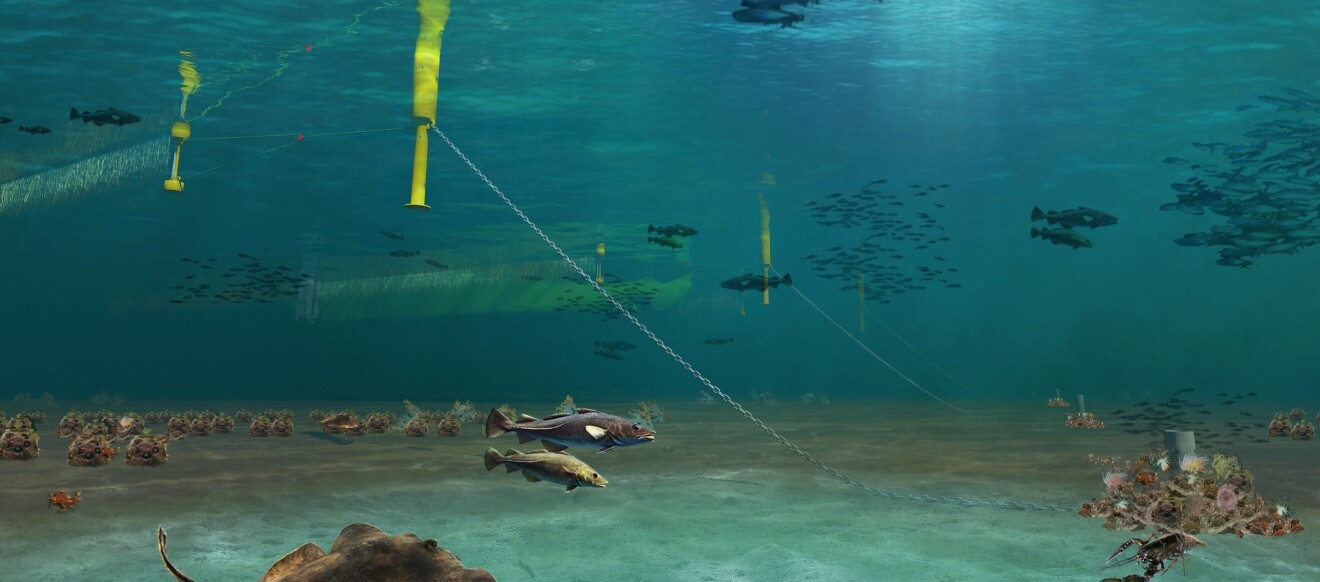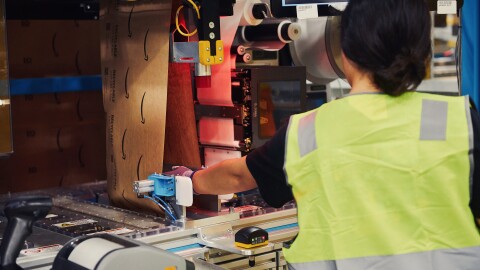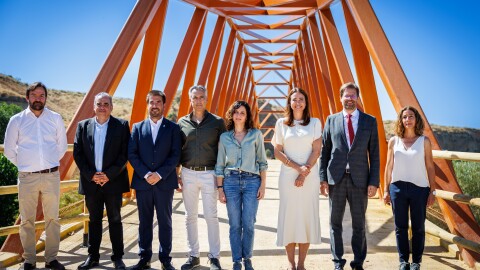- Seaweed has great potential to help tackle climate change by absorbing CO2 as it grows, and could enhance biodiversity.
- Locating seaweed farms between offshore wind turbines uses untapped space to capture carbon.
- If scaled, the European seaweed farming sector has the potential to reduce CO2 by millions of tonnes a year by 2040.
- Seaweed can also be used to manufacture packaging, food and clothing.
Amazon is funding the world’s first commercial-scale seaweed farm located between offshore wind turbines (shown above in a computer-generated image, courtesy of Smartland landscape architecture).
By locating the farm in previously empty space between turbines, the project is able to expand seaweed cultivation in the otherwise heavily used North Sea. If seaweed farming were to expand to occupy the entire space occupied by wind farms, expected to be approximately 1 million hectares by 2040, it could reduce millions of tonnes of CO2 annually.
The project is managed by a consortium of scientific researchers and partners from the seaweed industry, led by non-profit organisation North Sea Farmers (NSF), and is expected to become operational by the end of this year. The consortium hopes that North Sea Farm 1 will evolve into a blueprint for offshore seaweed farming the world over.
This content is hosted by a third party (www.youtube.com).
To view the content, you need to consent to cookies by selecting Accept all in the popup banner. Or you can go to the site footer, select Cookie Preferences, and then select On under Functional Cookies, Performance Cookies and Advertising Cookies.
Amazon is granting €1.5 million to create this first-of-its-kind seaweed farm and carry out a year’s scientific research into carbon reduction through seaweed farming. The funding comes from its $100 million global Right Now Climate Fund – Amazon’s commitment to support nature-based solutions, which is in addition to the work the company is doing to decarbonise its business. Through this fund, Amazon has committed €20 million to projects across Europe to enhance biodiversity and conserve, restore and improve nature in communities where Amazon operates.
The world’s first commercial-scale seaweed farm located between offshore wind turbines
North Sea Farm 1 aims to kickstart innovation in offshore seaweed farming. The grant will provide the investment required to construct a 10-hectare seaweed farm, which is expected to produce at least 6,000kg of fresh seaweed in its first year.

This funding will also support North Sea Farmers in analysing and improving the farm’s production capabilities. At the same time, researchers will explore the potential of seaweed farms to remove carbon from the atmosphere, modelling the impacts of large-scale seaweed farming. The non-profit hopes these findings will help play a role in scaling the industry. North Sea Farm 1 and others like it will also provide an opportunity to create jobs through the farming and production of seaweed-based products.
"Seaweed could be a key tool in removing carbon dioxide from the atmosphere, yet it’s currently farmed at a relatively small scale in Europe,” said Zak Watts, Director EU Sustainability at Amazon. “We're delighted to fund this project to help us reach a greater understanding of its ability to help fight climate change.”
The evolution of farming in the North Sea
North Sea Farmers (NSF) has championed the seaweed sector in Europe since 2014. The non-profit will lead the project, working with a consortium of organisations from across Europe that are involved in the entire seaweed production supply chain. This includes researchers Plymouth Marine Laboratory, Deltares and Silvestrum Climate Associates, seaweed extract manufacturers Algaia and marine contractors Van Oord.
Eef Brouwers, Manager of Farming and Technology at NSF, said: “Potentially, up to 85,000 full-time jobs could be created in the European seaweed sector by replicating North Sea Farm 1 across the North Sea, re-purposing the space amongst wind farms. These jobs would not only be in the farming process but also in the production and sales of seaweed-based products.”
As part of the Right Now Climate Fund’s commitment to funding nature-based projects in European communities, Amazon has already invested in a nature and wildlife restoration fund in France, a reforestation programme in Italy, an urban greening programme in Germany and a rewilding and tree planting project in the UK. Additionally, Amazon has funded forest conservation and restoration in the Appalachian Mountains in the United States, the Agroforestry and Restoration Accelerator programme in the Brazilian Amazon rainforest and Amazon is a key member of the LEAF Coalition, a new global public-private initiative to mobilise at least $1 billion to protect the world's tropical rainforests.
Learn more about our Right Now Climate Fund here.












